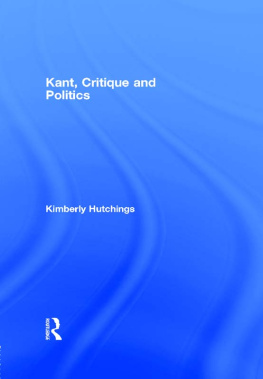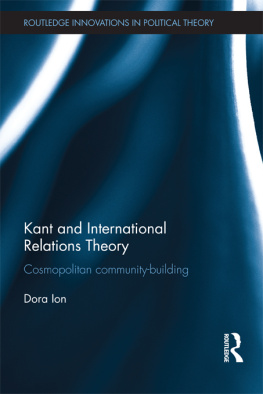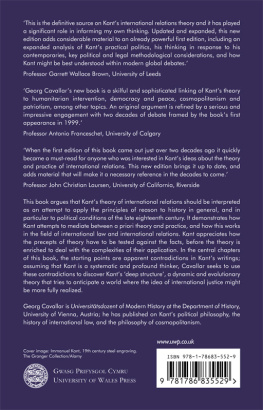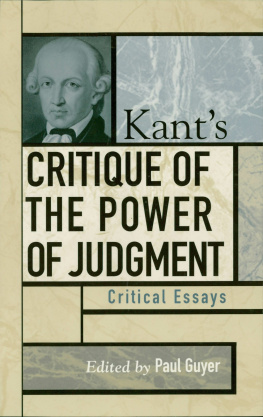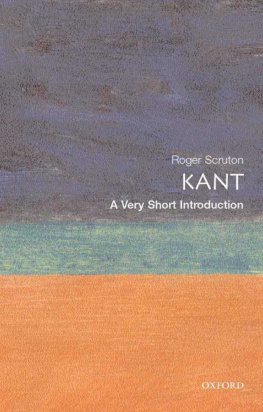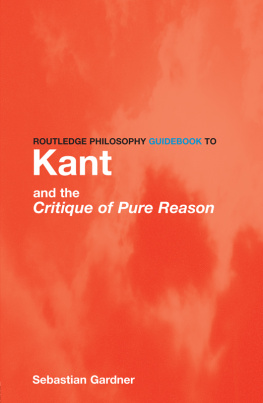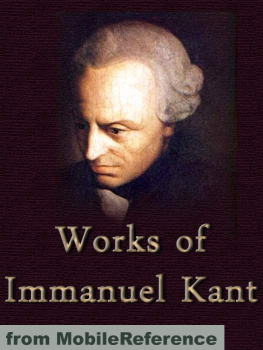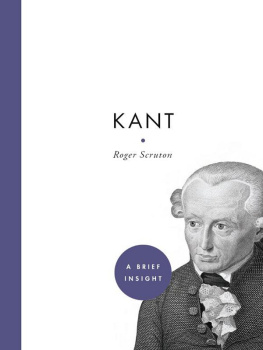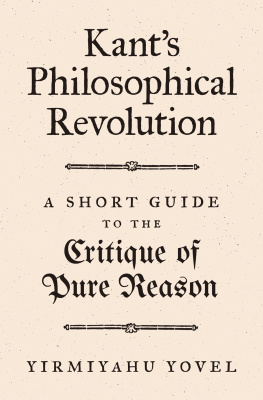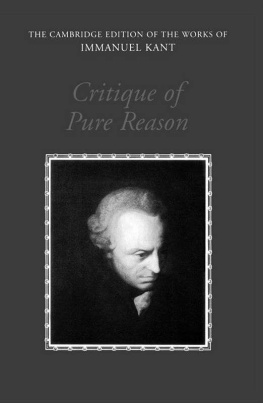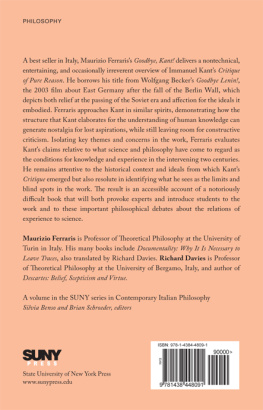KANT, CRITIQUE AND POLITICS
Kant, Critique and Politics not only shows the abiding relevance of Kant's critical philosophy for contemporary debates in social and political theory, international relations and feminist theory; it also challenges the view that his is a foundationalist argument. It makes an illuminating contribution to contemporary debate as well as to the understanding of the critical project.
Howard Caygill, author of A Kant Dictionary,
University of East Anglia
Hutchings lucidly reveals the paradoxes which Kant's critical philosophy was unable to resolve in its endeavour both to limit and to authorize reason. She then goes on, through a series of original and perceptive readings of recent thinkersHabermas, Arendt, Foucault, Lyotard, international relations and feminist theoriststo show how these Kantian aporias reassert themselves in modernity's tireless attempts at avoiding either relativism or foundationalism.
Diana Coole, Queen Mary and Westfield College,
University of London
Kimberly Hutchings re-evaluates Kant's work in terms of its significance for the writings of Habermas, Arendt, Lyotard and Foucault. This, however, is not an exercise in the history of ideas; through her clear presentation of Kant's critical philosophy, Hutchings reveals that the critique is in fact a complex and highly ambiguous political practice.
Hutchings's reading traces a common Kantian heritage in theories thought to represent the different poles of the modernist-postmodernist debate and sheds new light on the Kantian influence in political philosophy, international relations theory and feminist theory.
Kimberly Hutchings is Lecturer in Political Theory at the University of Edinburgh.
KANT, CRITIQUE AND POLITICS
Kimberly Hutchings

First published 1996 by
Routledge 11 New Fetter Lane, London EC4P 4EE
This edition published in the Taylor & Francis e-Library, 2006.
To purchase your own copy of this or any of Taylor & Francis or Routledge's collection of thousands of eBooks please go to http://www.ebookstore.tandf.co.uk/.
Simultaneously published in the USA and Canada by Routledge 29 West 35th Street, New York, NY 10001
1996 Kimberly Hutchings
All rights reserved. No part of this book may be reprinted or reproduced or
utilized in any form or by any electronic, mechanical, or other
means, now known or hereafter invented, including photocopying and
recording, or in any information storage or retrieval system,
without permission in writing from the publishers.
British Library Cataloguing in Publication Data
A catalogue record for this book is available from the British Library
Library of Congress Cataloguing in Publication Data
A catalogue record for this book has been requested.
ISBN 0-203-00557-0 Master e-book ISBN
ISBN 0-203-29941-8 (OEB Format)
ISBN 0-415-10507-2 (hbk)
ISBN 0-415-10508-0 (pbk)
This book is dedicated to
Pat and John Hutchings
with all my love and thanks
CONTENTS
PREFACE AND ACKNOWLEDGEMENTS
Anyone writing a new book on Kant, let alone Habermas, Arendt, Foucault and Lyotard, needs to justify the production of yet another mass of words on such a well researched subject. In traditional Kantian fashion, I find myself striving for some authoritative ground on which to vindicate my efforts. However, this striving, like Kant's striving to authorize critique, is ultimately unsuccessful. All I can do is to offer certain reasons for why I have written this book and for why you may want to read it.
Foremost among my reasons for writing this book is a fascination with the way in which Kant continues to haunt the options of contemporary social and political theory, even when these options seem antithetical to one another. In investigating Kantian critique as a paradoxical political practice rather than as failed or successful metaphysics, I have tried to establish why the legacy of Kant seems so inescapable. A second reason for writing this particular book is to put the recent revival of interest in Kant's political thought, particularly his thought on judgement, into context. Again, I have tried to demonstrate that the importance of Kant's political thought lies not in its claims about the state or history, but in the claims it makes for the political significance of his philosophical practice. A third reason for writing the book is to illuminate the thought of Habermas, Arendt, Foucault and Lyotard by systematically examining their use of Kant. The importance of Kant for all four thinkers is well attested by both the thinkers themselves and existing secondary literature. What I have attempted to do is to explain how such very different theorists are able to share a common philosophical legacy. My fourth reason for writing the book is that the implications of Kant's critical practice are very much apparent in attempts to formulate critical political theory in the contexts of international relations and feminist theory. By situating these debates in relation to the Kantian inheritance, I try to elucidate both the positive and negative implications of the paradoxical politics of critique for those debates. Finally, I wrote this book because the practice of Kantian critique has at its centre the radical impossibility of transcending the limits on which critique is premised, and I find this radical impossibility still at work in the thought of Habermas, Arendt, Foucault and Lyotard. I cannot answer the question as to why, when Kant has been dead nearly two hundred years, his work still receives an echo in today's philosophical imagination, but I can at least raise that question. If that is all that this book succeeds in doing, then that is all the vindication which I need for having written it.
It is impossible to render all the necessary thanks to people who have helped and supported me personally and academically over the time during which this book was conceived and written. I would, however, like to single out certain people to whom I owe a particularly important debt. I would like to thank Gillian Rose both for the philosophical inspiration she provides and the support and encouragement she has given me over the years. Many thanks are due to Andrew Thacker for reading and commenting on the whole of the text, and also to Howard Caygill and Moya Lloyd for looking at certain sections. The following people have helped and encouraged me in my philosophical work: thanks to Keith Ansell-Pearson, Alan Apperley, Christine Battersby, Jay Bernstein and Kevin Magill. Thanks are due to the University of Wolverhampton for granting me a partial sabbatical in 1993 to work on the book. I also owe thanks to Steve Gill for introducing me to the world of international relations theory, and to the members of the BISA seminar on international relations theory, the Gender and International Relations group and the Society for Women in Philosophy, who have provided the forum for discussion of some of the material that went into this book. Earlier versions of material for Chapters 7 and 8 have been published as articles and I would like to thank the readers and editors involved for their help; Richard Little, Kathleen Lennon and Margaret Whitford (Hutchings, 1992; 1994). Needless to say, any errors remaining in these chapters or any other section of the text remain solely my responsibility. For their friendship, particularly during the difficult months in which this book was finished, I would like to thank Marci Green, Bernadette Joslin, Mary Joyce, Margaret Ponsonby, Susan Pryse-Davies and Jean Scott. For his proofreading services on the manuscript and his friendship, I would like to thank Mike Cunningham. Last, but by no means least, I would like to repeat my thanks to my parents, to whom this book is dedicated.

